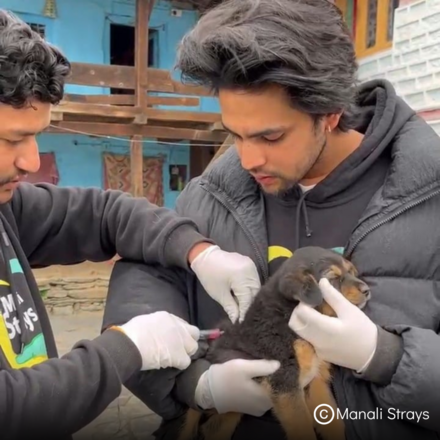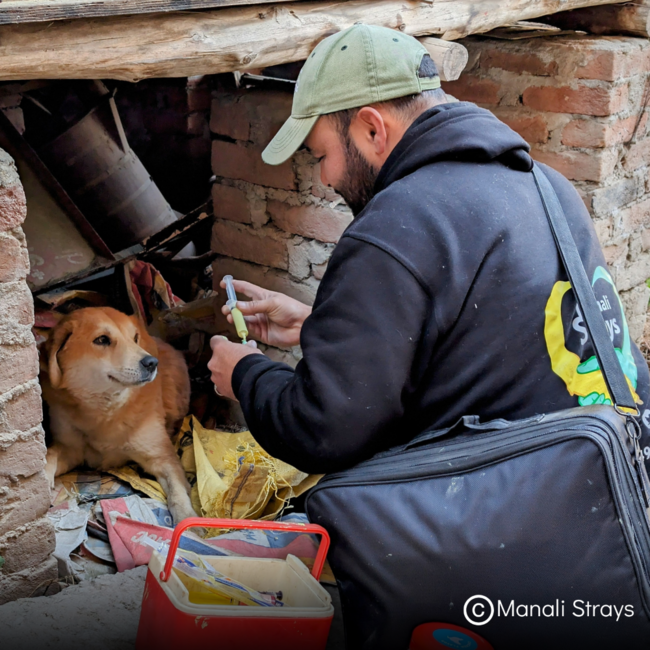Kerenza Chats with Champions: Manali Strays’ Fight Against Rabies

In the picturesque town of Manali, nestled in the Himalayan mountains of Himachal Pradesh in India, a dedicated team of animal lovers is tackling one of the region's most persistent public health challenges: rabies. Manali Strays, co-founded in 2019, goes beyond rescuing injured and abandoned animals. Their mission extends deep into the mountains, where myths about rabies and a lack of resources put both people and animals at risk.
Through rescue, vaccination drives, humane education, and tireless outreach, Manali Strays is not only saving human and animal lives but also reshaping how communities perceive and care for street dogs. Kerenza from GARC recently had the chance to speak with Dr Becky Metcalf, co-founder of Manali Strays, about their impactful work, the challenges they face in remote villages, and the inspiring stories that fuel their mission.
An Interview with Becky:

Q1: How do you approach changing attitudes toward street dogs in the community?
A: It’s a gradual process, but we’re seeing progress. More locals are vaccinating their pets against rabies, and many now adopt “indie dogs” rather than purchasing purebred breeds. We also educate children through school programs, teaching them about dog welfare, behavior, and rabies prevention. When kids learn to understand and respect animals, it changes how entire families view street dogs, many of which are owned but roaming. It’s slow, but every step forward counts.
Q2: What’s it like working in remote villages to control rabies?
A: It’s challenging, to say the least. Some villages are hours away, and outbreaks can spread quickly from one to the next. Last year, we witnessed rabies cases moving across several rural areas, and we had to act fast—traveling to vaccinate dogs and educate people to contain the spread. In the last four years, we’ve vaccinated over 6,000 dogs in the wider area, but many of these remote communities are still underserved due to limited resources. Despite the challenges, we’re committed to extending our sterilization and vaccination efforts further into these rural villages to prevent future outbreaks and save lives.
Q3: Myths about rabies can be dangerous. Have you encountered any in your work?
A: Oh, plenty! One of the strangest ones is the belief that if you’re bitten by a rabid dog, you’ll give birth to puppies. It’s a bizarre and deeply rooted myth that causes unnecessary fear. Others think visiting a temple when wounded, will protect them from rabies. Myths like these not only increase the stigma against dogs but also delay life-saving medical care. Through our humane education programs, especially in schools, we’re working to dispel these misconceptions and teach people how to respond to dog bites correctly.
Q4: Can you share a story that highlights the impact of your work?
A: One story that comes to mind is Dudley, a street dog who came to us with a severe wound—half his face was missing, and he was on the brink of death. Initially, we thought he wouldn’t survive, but we decided to try. With time, care, and treatment, Dudley made an incredible recovery. Today, he’s healthy and happy, playing with other dogs at our shelter. Seeing him thrive despite his trauma is a reminder of why we do this work.
Q5: Collaboration is essential in animal welfare. How does Manali Strays work with other NGOs?
A: Collaboration is key to achieving meaningful change. We’ve worked closely with Dharamsala Animal Rescue to share best practices, and Neighbourhood Woof joined us for a sterilization camp where we collectively spayed and neutered over 100 dogs. Each organization brings unique strengths—whether it’s expertise, resources, or simply moral support. By working together, we can cover more ground and make a bigger impact, particularly in areas like rabies control and humane education.
Closing Words: Communities Against Rabies
Manali Strays is not just a beacon of hope for animals in Himachal Pradesh—it’s a model of excellence. As a Rabies Center of Excellence, they combine scientific rigor, education, and collaboration with other NGOs to fight rabies and promote animal welfare. Their work in remote villages, their commitment to dispelling myths, and their partnerships with groups like Dharamsala Animal Rescue (also a recognized RCE) and Neighbourhood Woof underscore the power of collective action. Together, they’re creating a safer, healthier future for both people and animals.
To support or learn more about Manali Strays, visit Manali Strays' website.
Discover how Communities Against Rabies is working to eliminate rabies through education, vaccination, and community engagement. Learn how your organization can become a Rabies Center of Excellence and make a lasting impact.
